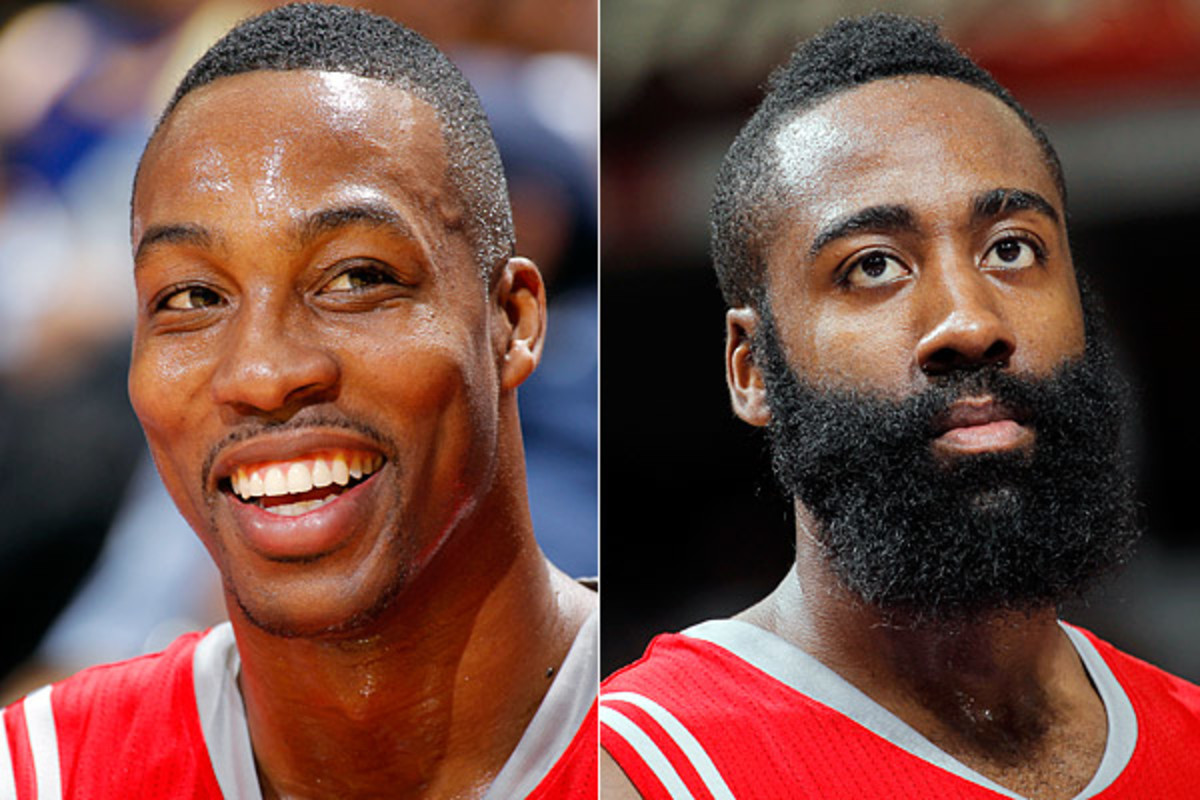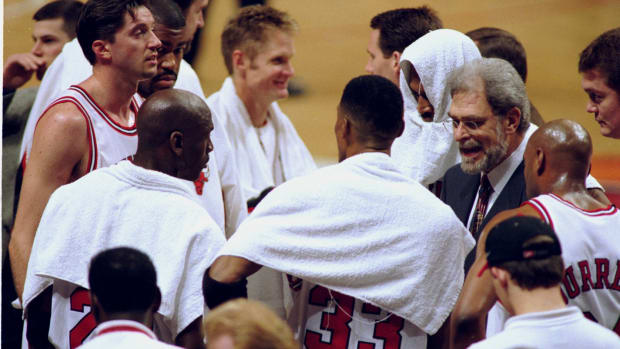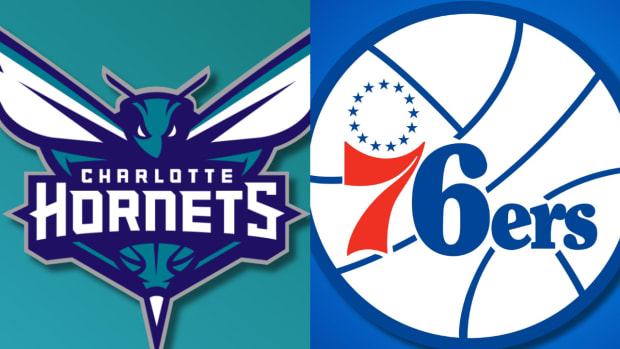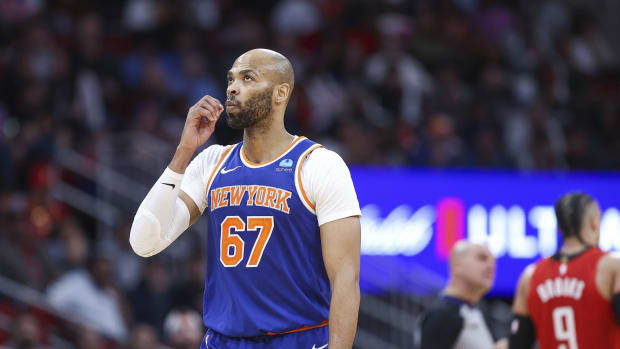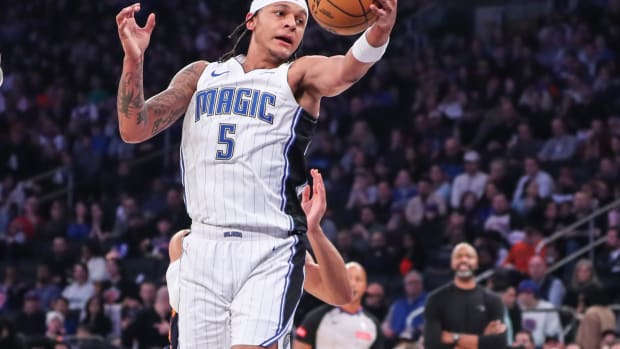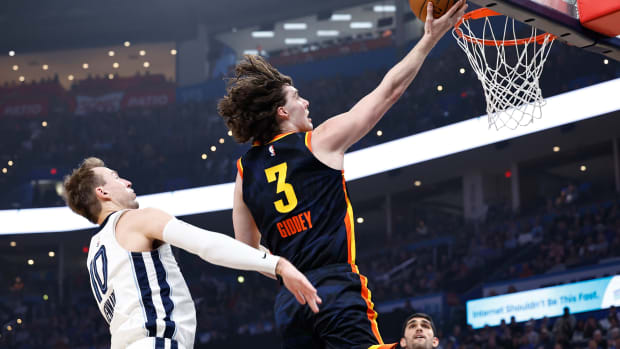The Fundamentals: Why the Rockets are emerging as championship contenders
Dwight Howard (left) and James Harden have the Rockets on a roll. (NBAE via Getty Images)
Declaring an NBA team to be a championship contender is an expression of trust. We trust in Miami's ability to flip the switch and in its history of playoff perseverance. We trust in Oklahoma City's ability to overwhelm, in Indiana's constricting defense and in San Antonio's balanced execution. Each of those teams projects a credible stability that makes a triumphant postseason run plausible.
Houston, next in line record-wise (along with Portland) behind those four contenders, isn't trusted in quite the same way. Any claim of the Rockets' potential for a winning run seems steeped in the conditional: They're one piece away, they need Dwight Howard to be more dominant in the post, they should be playing this way or that. Some noted objections are more valid than others, as Houston is a team of evident flaws. But over the past few months the Rockets have also established themselves to the point that their contending credentials should be examined beyond the familiar criticism.
Since Jan. 1, Houston has been the second-best team in the league by pace-adjusted point differential. Terrence Jones and Donatas Motiejunas have stepped in to fill the gaping hole at power forward. After being frustrated and injured, center Omer Asik has settled in to play about 15 needed minutes a game behind Howard. Point guard Patrick Beverley is healthy again and starting, and shooting guard James Harden's scoring game has crested in February (29 points per game on 48.7 percent shooting). Everything seems to be falling into place for the stretch run after injuries and lineup tweaks kept Houston from properly balancing itself.
POWER RANKINGS: Rockets solid at No. 4
The Rockets have won 10 of their last 11 games and are closing in on any reasonable threshold for championship contention. As a basic litmus test, most contemporary title contenders have ranked in the top 10 in both offense and defense. There are some exceptions (including this season's Pacers, a below-average offensive team), but that kind of two-way balance is a loose guideline for championship basketball.
Houston qualifies, contrary to what the Rockets' bloated points-allowed-per-game figure (or your talking head of choice) might suggest. Pace of play is not a demerit; how many points the fast-breaking Rockets surrender on a per-game basis matters far less than how much they give up per possession. It's the micro that matters. The speed of the game naturally fluctuates from minute to minute. It's only by reducing basketball to its most basic unit -- the possession -- that performance can be evaluated to account for those near-constant shifts in tempo.
Once reframed in that light, the Rockets are ninth in defense this season and sixth since Jan. 1 -- a stark difference from Houston's No. 19 ranking in points allowed per game. The Rockets' contagious style encourages opponents to fuel the game's pace, but Houston has managed to keep things in check by playing the best transition defense in the league, according to Synergy Sports. The Rockets have maintained the impossible balance of attacking the offensive glass while still getting back to defend. Beverley, forward Chandler Parsons and guard Jeremy Lin, in particular, have a great sense of when to retreat. It also doesn't hurt that Howard and Asik -- two of the NBA's better offensive rebounders -- can hang around to compete for boards on their own, an act that can delay or prevent a fast break.
GOLLIVER: Parsons among top second-round steals
The Rockets' starting lineup of (from left) Patrick Beverley, Chandler Parsons, James Harden, Terrence Jones and Dwight Howard fuels one of the NBA's top offenses. (Thearon W. Henderson/Getty Images)
There are still plenty of gaps in the Rockets' coverage, which can drift toward ball-watching laziness when the perimeter defenders aren't fully locked in. That's where Beverley becomes particularly useful. He guarantees Houston one fully committed, work-'til-you-drop defender as a member of its perimeter core. Beverley has missed 18 games, but when he's on the floor -- pestering, swiping and generally driving opponents insane -- Houston defends at a top-three level. He crowds Stephen Curry. He hounds Russell Westbrook. He pressures at the point of attack so that Houston's other defensive issues (including a floating 6-foot-5 one named James Harden) might be mitigated.
Coupled with Howard, Asik and Jones hovering in help, Beverley does enough to impede his opponent's progress and disrupt a possession. It's up to his teammates to communicate and respond accordingly within their own assignments, tasks in which the other Rockets have become more reliable over the course of the season. Houston might not always seem terribly organized in its team defense, but there is a sense of place and order to what the Rockets do and enough well-meaning defenders to make it all work. The matchups often require manipulation and the rotations aren't always tidy, but having elite defenders in position to stall the offense's initiation and contest anything that comes near the rim go a long way -- long enough to give the Rockets an opportunity to build a winning margin with their offense.
True to reputation, Houston gains the most ground offensively. Its style sets the tone, pulls opponents out of their comfort zone and helps either create or halt momentum. Houston ranks fifth in points scored per possession, and the quality of its offense can be as crushing as its quantity. Few offenses are so capable of nudging opponents to dejection within a few minutes' time. All it takes is but a few consecutive three-pointers for the Rockets to catch like wildfire, ripping through open space and eating up every bit of oxygen in the arena.
[polldaddy poll=7832725]
Those baskets become a run, that run grows into a surge and soon Houston is making its opponents second-guess every decision for fear of what comes next. Houston's leads escalate quickly with that kind of furious roll; the Rockets have seven 40-point quarters this season, including a 42-point haymaker in Tuesday's 129-103 victory at Sacramento on Tuesday. (Harden scored 25 of those 42 points and finished with 43 in three quarters.) Almost all of Houston's highest-scoring quarters have played out under similar timing, as the Rockets tend to do their damage early and in considerable volume.
That's not necessarily by design, but Houston's guiding philosophy does lend itself to strong opening statements. No team has played better in the first halves of games than the Rockets, who storm into every game equipped with a developed team concept. They know exactly what kind of shots to seek and how to get them, all of which is made easier by their collective readiness to ramp up their offensive tempo and take quality shots when available.
As simple as that approach may be, Houston's shot distribution still deviates sharply from NBA convention. As a result, the Rockets can be a bit tricky to process. They tend to draw tired criticism as a "jump-shooting team," if only because they're ready and eager to launch an open three-pointer. Houston understands that the shot clock is a construct; it does not define what makes a good attempt, nor should it prevent a player from shooting when free. That the Rockets -- especially Harden and Parsons -- are very willing to fire away early in the shot clock and early in a play's development makes them jarring to watch but only serves to enhance their blistering offensive efficiency.
That approach has created the illusion of three-point reliance. In reality, however, Houston has the inside-out balance to rival that of any team. Along with leading the NBA in three-point attempts, the Rockets rank third in the percentage of points drawn from free throws. Behind Harden's drives and Howard's finishes, they are fourth in percentage of points scored in the paint. In tandem, that means "easy points" account for the greatest cut (68.4 percent) among prospective playoff teams. In that framing, the Rockets' three-point gunning is simply a way to pitch an already effective unit over the top.
When the scoring lags, it's typically because that quick-hitting rhythm comes to a halt. Harden, for all his talents, is the most common culprit. He's a tremendous creator, but Harden's forays into casual isolation can sometimes pose big problems for the Rockets' flow. Every team needs to be prepared for the inevitability of iso basketball -- it's a failsafe option for when other plans fall apart and means for attacking mismatches directly. But Harden is guilty of bleeding the clock dry with dribble moves, only to then dump the ball off to a teammate with a 24-second violation looming.






























